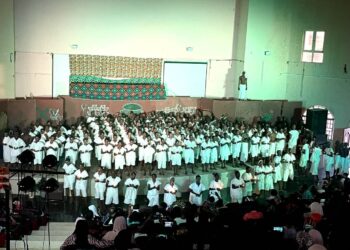By Femi Emmanuel
The growing wave of vandalism during protests in Nigeria, particularly by the youth, raises critical questions about patriotism, lawful expression, and civic responsibility. While it is within the constitutional rights of every Nigerian to protest peacefully, the destruction of public property under the guise of remonstration only undermines the very cause protesters claim to champion.

This concern was starkly illustrated on Monday, June 30, 2025, in Lafiagi, the headquarters of Edu Local Government Area in Kwara State. Following the abduction of a prominent agro-chemical businessman popularly known as Alhaji Chemical, tensions soared across the community. He was reportedly kidnapped from his residence in the Taiwo area of Lafiagi around 1:00 a.m. on Sunday. The incident, seen as part of a rising trend of insecurity and kidnappings, sparked outrage among local youths who took to the streets in protest.
However, what began as a show of public dissatisfaction quickly escalated into a violent and destructive episode. The angry protesters resorted to arson, setting ablaze the palace of the Emir of Lafiagi, His Royal Highness Alhaji Mohammed Kudu Kawu. The office of the National Drug Law Enforcement Agency (NDLEA) was not spared either, as it too was vandalized and torched.
These acts of vandalism not only contravene the principles of lawful protest but also tarnish the image of Nigerian citizens before the global community. Destruction of government and traditional institutions does not convey a strong message of patriotism—it projects lawlessness and recklessness, ultimately weakening the integrity of any social movement.
The Legal and Moral Boundaries of Protest
It is imperative to remember that the right to protest is enshrined in Chapter IV of the 1999 Nigerian Constitution. Section 40 specifically guarantees the right to peaceful assembly and association. This includes the right of citizens to express their grievances through protests. However, this right comes with responsibilities. Peaceful protest must not be misconstrued as a license to commit criminal acts such as vandalism, arson, or the destruction of public infrastructure.
Criticizing the government or demanding justice is not a crime. But such demands must be made constructively and peacefully. When violence becomes the vehicle for protest, it overshadows the cause and alienates potential allies, including those in positions of power who might have championed the change being sought.
The Cost of Destruction
The aftermath of vandalism during protests imposes heavy costs on government resources—resources that could have been channeled towards education, healthcare, and, ironically, security reforms. Burning down state infrastructure sets back community development and creates a deeper sense of disillusionment, rather than achieving the reform protesters hope for.
More importantly, the wanton destruction of public institutions during protests contradicts the very essence of democracy. It diverts attention from the original issue—in this case, insecurity—and focuses public discourse on the violence rather than the urgent need for better security measures.
A Call for Sensitization and Civic Education
There is an urgent need for stakeholders—community leaders, civil society groups, educators, and government agencies—to sensitize the youth on the appropriate ways to channel grievances. Protests should be a tool for engagement, not destruction. Demonstrating civic maturity means understanding that vandalism only leads to further setbacks in national development.
Every youth must come to terms with the reality that destroying public or private property in anger does not solve the problem of insecurity. On the contrary, it creates more chaos and places additional burdens on already overstretched national and local budgets.
Conclusion
Peaceful protest remains one of the most powerful tools in a democratic society. It is through organized, non-violent civic action that real change is often achieved. The acts of vandalism witnessed in Lafiagi are regrettable and must be condemned by all well-meaning Nigerians.
Rather than resorting to violence, Nigerian youths must lead with reason, dialogue, and unity. Insecurity is a national concern, and its solution lies not in burning institutions, but iln engaging government constructively, holding leaders accountable, and standing together to demand better governance.
If Nigeria is to progress as a sovereign nation, its citizens must embrace protest as a democratic right—not as an excuse for destruction.
You can get every of our news as soon as they drop on WhatsApp ...To get all news updates, Join our WhatsApp Group (Click Here)












